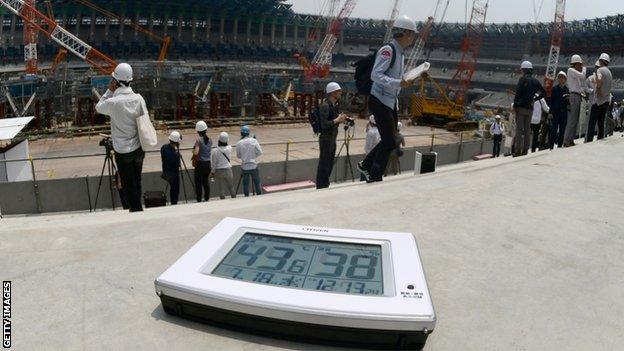Tokyo Olympics: Experts warn Games chiefs about extreme heat
- Published

Temperatures are close to danger levels for some events
Olympic Games on the BBC |
|---|
Hosts: Tokyo, Japan Dates: 23 July-8 August |
Coverage: Watch live on BBC TV, BBC iPlayer, BBC Red Button and online; Listen on BBC Radio 5 Live, Sports Extra and Sounds; live text and video clips on BBC Sport website and app. |
Experts have warned Tokyo 2020 chiefs that athletes need protection from extreme heat as well as Covid-19.
The Japanese Environment Agency has issued heatstroke alerts this week.
Heat and humidity have hit extreme levels just days before the start of the Olympic Games.
Government data suggests the Wet Bulb Globe Temperature (WBGT) - a measure combining heat and humidity, used by organisers to assess safety - hit 31.8°C.
This is close to danger limits for some sports, such as the triathlon, which cannot start if WBGT levels are above 32.2°C.
Olympic organisers say they are prepared for high temperatures - but in a study compiled before the Games, athletes and scientists warned that heat and humidity could pose a significant threat to competitors.
Dr Jonathan Buzan, of the University of Bern Physics Institute, said: "They will find it tough, and endurance athletes will find it impacts their performance.
"The main health focus ahead of these Games has been on Japan's Covid outbreak, but organisers must show a duty of care to athletes and ensure that events do not start under dangerous temperatures."
Dr Fahad Saeed, Scientific Model and Data Manager, added: "Japan has witnessed record-breaking heatwaves in recent years, and we know this is due to human-driven climate change.
"At 32°C wet bulb temperature we know that outdoor labour becomes dangerous, even deadly. Combine this with, say, attempting a marathon, and you're courting serious health risks."
British athletes competing in outdoor events have been training for the extreme temperatures, including Jamie Murray, who received a late call-up to the tennis team after British number one Dan Evans tested positive for coronavirus before leaving Britain. He will rejoin his former partner Neal Skupski in the men's doubles.
Allow Instagram content?
This article contains content provided by Instagram. We ask for your permission before anything is loaded, as they may be using cookies and other technologies. You may want to read Meta’s Instagram cookie policy, external and privacy policy, external before accepting. To view this content choose ‘accept and continue’.
Members of the Team GB equestrian squad have also spoken of their plans to protect riders and horses from the extreme conditions, training in the Bisham Abbey heat chamber as preparation.
Showjumper Holly Smith said: "We are used to higher temperatures [in Europe] but the higher humidity is something new."
Eventer Laura Collett added: "The riders have gone to Bisham Abbey to do a bit of work in the heat chamber, and that's been really helpful and useful to know how your body is going to react and adapt to that humidity."
Along with the marathon being moved to Sapporo, organisers have looked at other options such as cooling-mist machines and surfacing roads along the route with a heat-reducing reflective material.
"There will be cooling stations not just for human beings but also for horses," Games delivery officer Hidemasa Nakamura said.
"For volunteers, we have salt candies, tablets and ice cream."

The Rap Game UK Season 3: DJ Target, Krept and Konan hunt for the next big MC
Transforming a rental into your dream space: It's boys versus girls when it comes to decorating this house share!
